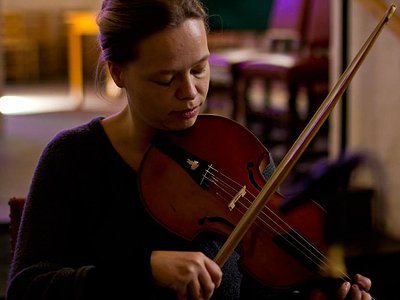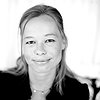Could you describe your creative process on the basis of a piece or album that's particularly dear to you, please? Where did the ideas come from, how were they transformed in your mind, what did you start with and how do you refine these beginnings into the finished work of art?
When I began composing, I wrote out of pure inspiration, I think. There were so many ideas that just evolved, without so much effort. Now, I prefer to work from a specific idea. An example of that is the previous album of Slagr, called Short stories, which is based on one short story, called “On an Old Farmstead in Europe” by Norwegian author Hans Herbjørnsrud. The frame of the novel is a woman with some special powers living in the 1600s, a kind of seer, who experiences a dramatic flood. The author of the story discovers her scull on his field one day, and is able to lure out parts of her story. This quite surreal story has lots of intense descriptions of nature and a rhythm in the language which is quite spellbinding.
I loved writing music to this novel, and still, when performing one of these tunes with Slagr, I immediately get clear images in my mind. My way of writing music to this short story, was to find smaller elements in the story that I found especially fascinating, and try to imagine what the sound of this passage could be.
There are many descriptions of the ideal state of mind for being creative. What is it like for you? What supports this ideal state of mind and what are distractions? Are there strategies to enter into this state more easily?
I think, for my part, the ideal state is just to work. I have a theme, it could be a story, a sentence, a painting, whatever, and then I decide on the framework of the tune – tonality, a hint of development (though the piece often develops in a completely different direction than I had initially planned), rhythm and so on. Often, I find a theme on my instrument, and then I start writing in Sibelius. I trust that eventually, I will find something interesting, and I usually do. It’s just all about work.
When I find something interesting, something in the music that grabs me, a feeling that – “oh, here is something that has a sting,” then I can experience flow and just keep on writing without fighting. Afterwards, I understand that this was a state of inspiration.
How is playing live and writing music in the studio connected? What do you achieve and draw from each experience personally? How do you see the relationship between improvisation and composition in this regard?
As a musician now with some experience of composing, I know that everything is open in the moment. Everything is possible in the moment. Eventually you play the next note as planned, but this understanding of the possibility – of playing something a little bit different or completely different in the moment, is widening for a musical mind. As a composer, my playing inevitably is the basic source of what I write. I sometimes write music which is idiomatically difficult or unfavourable for me to play, but the result is just as much attached to me as a performer.
How do you see the relationship between the 'sound' aspects of music and the 'composition' aspects? How do you work with sound and timbre to meet certain production ideas and in which way can certain sounds already take on compositional qualities?
Sound has always been a focus for me, unconsciously and, gradually, consciously. Starting to play the hardanger fiddle, it was the specific timbre; a kind of sparkling, clear, and yet granular, porous sound, that really grabbed me. Now, specific sound qualities can form the basis of a whole piece. For example, the piece called “Gamletun” (Farmstead) with Slagr is built on very monotonous chords using flageolets with sordin (muted strings) and harmonic glasses on top. The piece is supposed to illustrate an anonymous stretch of land or field, by the road on a rainy day, existing as it has done through “all” time. Just playing the first notes of that piece, brings me to that field.
Our sense of hearing shares intriguing connections to other senses. From your experience, what are some of the most inspiring overlaps between different senses - and what do they tell us about the way our senses work? What happens to sound at its outermost borders?
I’ve always been attached to the link between music and colour nuances. I have no precise colour map, as some people really have but I have six fiddles, each with their different personality and with their specific tuning. Their sound and the character of the tuning gives me associations to colours, and not only me: in the traditional hardanger fiddle repertoire there are more than 20 different tuning (scordatura) options for the fiddle. The tunings have specific names, and some of them have colour names, such as “grey lightening”, “green”, “light blue”. It’s quite poetic, I think. Probably it’s linked to times of the day.
Art can be a purpose in its own right, but it can also directly feed back into everyday life, take on a social and political role and lead to more engagement. Can you describe your approach to art and being an artist?
I’ve always been focused on the autonomy of music. Music is its own world, and it’s enough. Our tasks as composers and musicians is to bring music in an inspired, all-focused atmosphere, and let people take part in something that doesn’t need to mean the same to the listener as it does to the performer/composer. The concept of sharing something with an inner nerve, focus, intensity and devotion is, in my opinion, what it’s all about.
Then, in my later years, art has become more involved with politics, a concept I frowned upon, but now it has affected me quite a lot, and I’ve found great pleasure and meaning in involving my music in shows that deal with political issues like climate change and the challenges it leads to, the refugee crisis and the growing gap between the haves and the have-nots. I feel it gives the music an extra aspect, the presence of a clear meaning is quite seductive. Even though, I absolutely stand by the thought that music is its own thing, it’s not something you can define. It’s the fragility of music and the strength of music.
It is remarkable, in a way, that we have arrived in the 21st century with the basic concept of music still intact. Do you have a vision of music, an idea of what music could be beyond its current form?
To me, music is the possibility to express all the emotions that our languages can’t, and that’s quite a lot, in my opinion. Playing music is a way of understanding yourself, coming to terms with yourself, a kind of inner conversation. Listening to music has some of the same effects.



